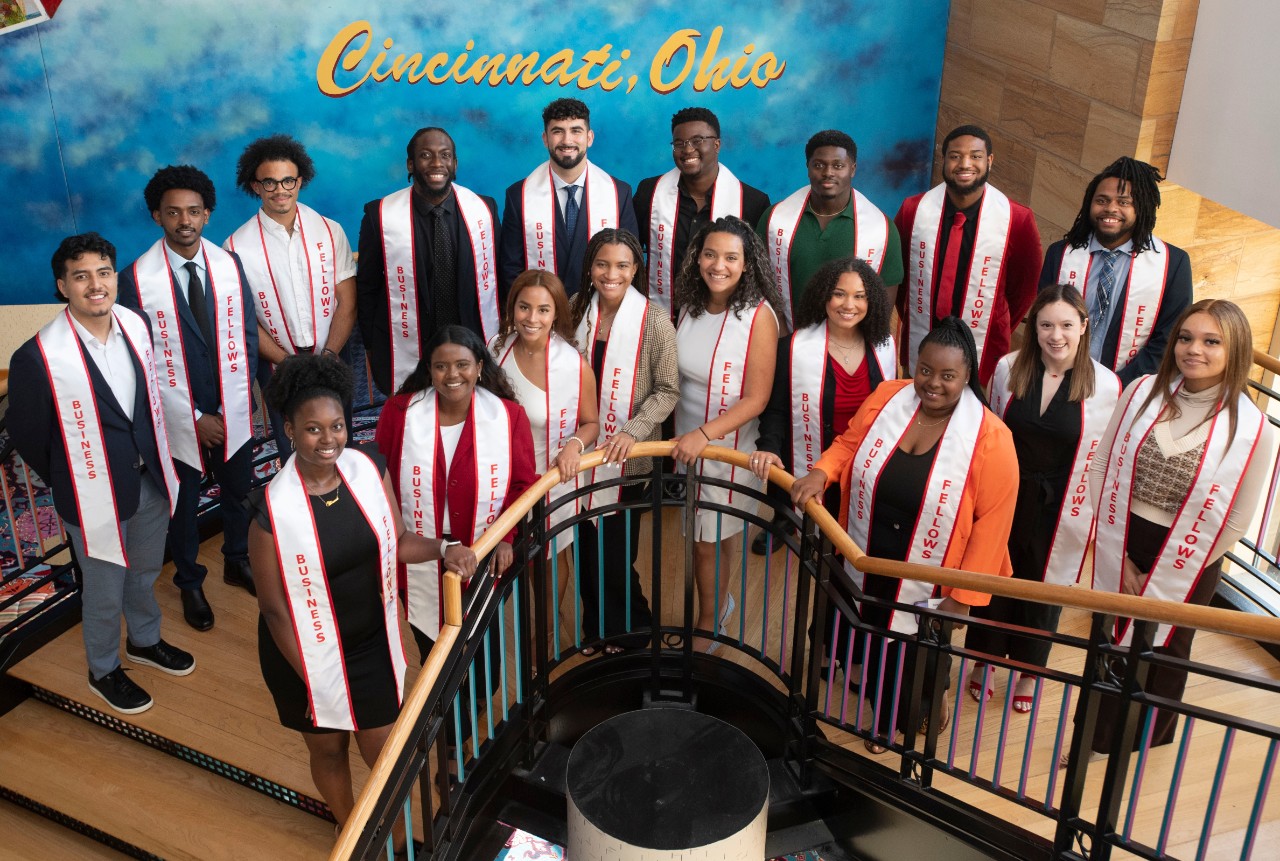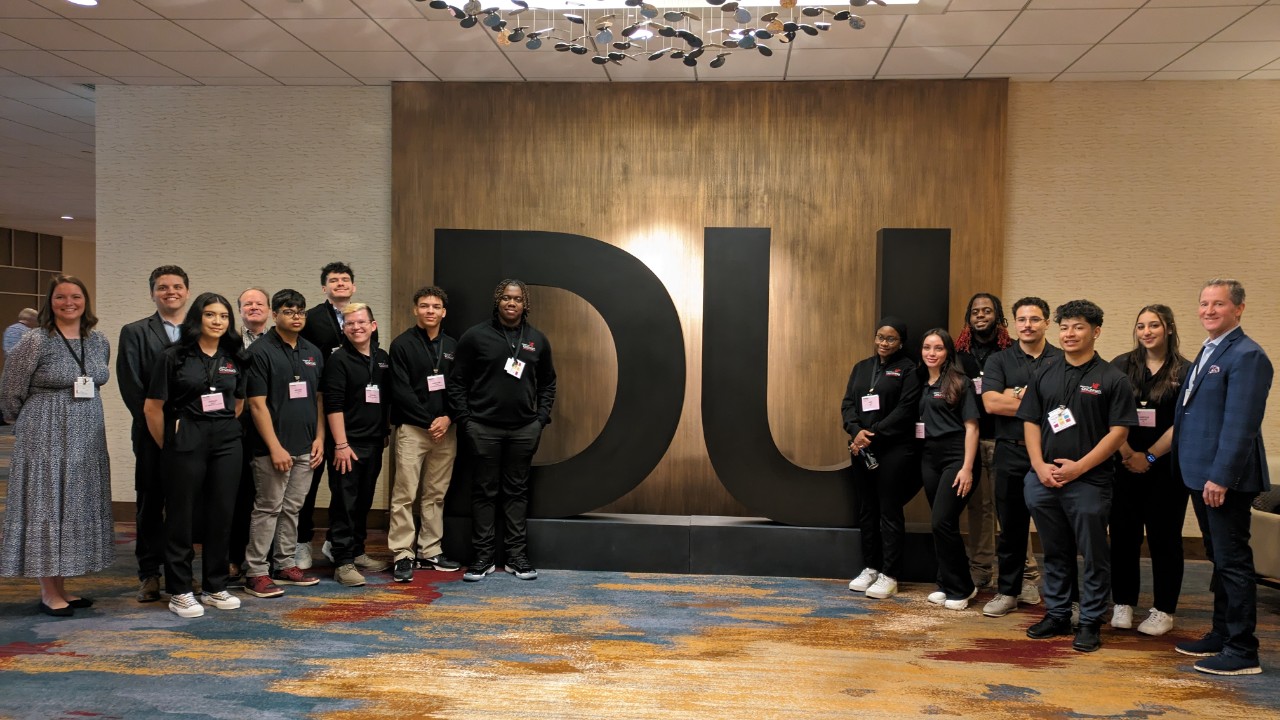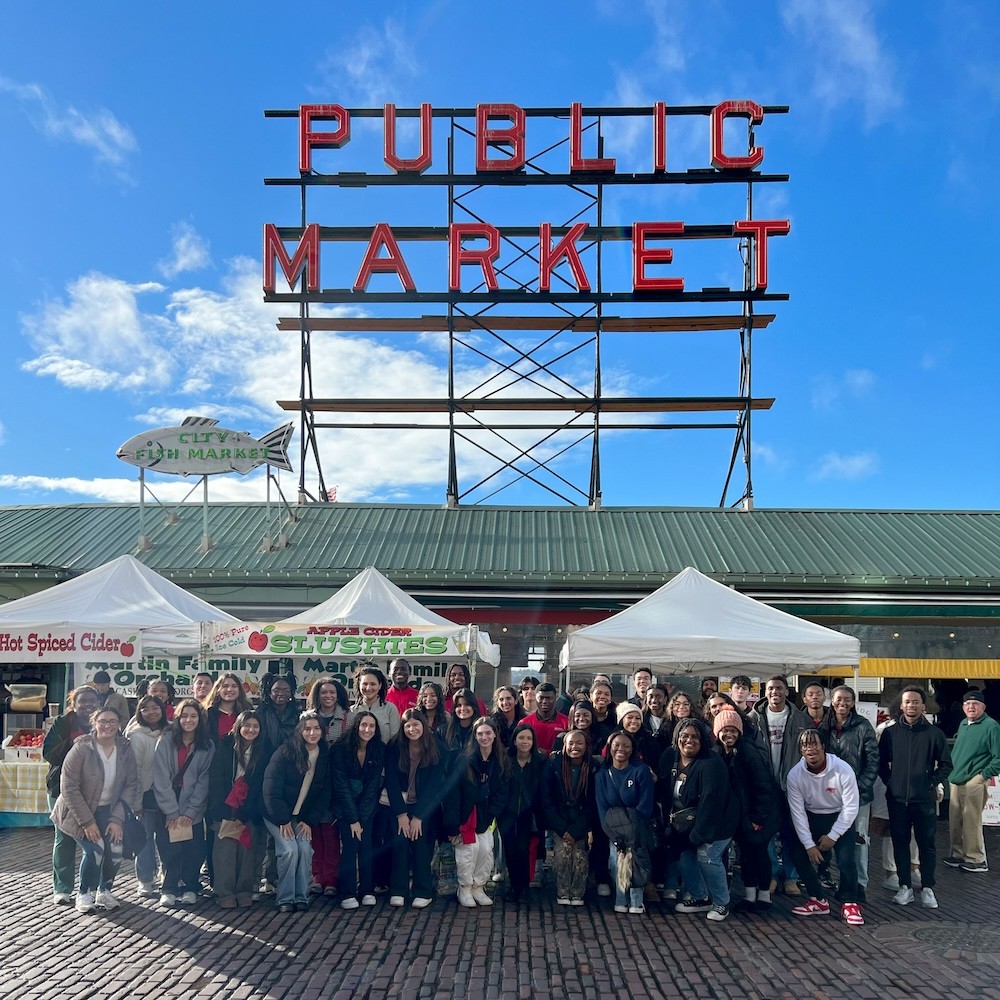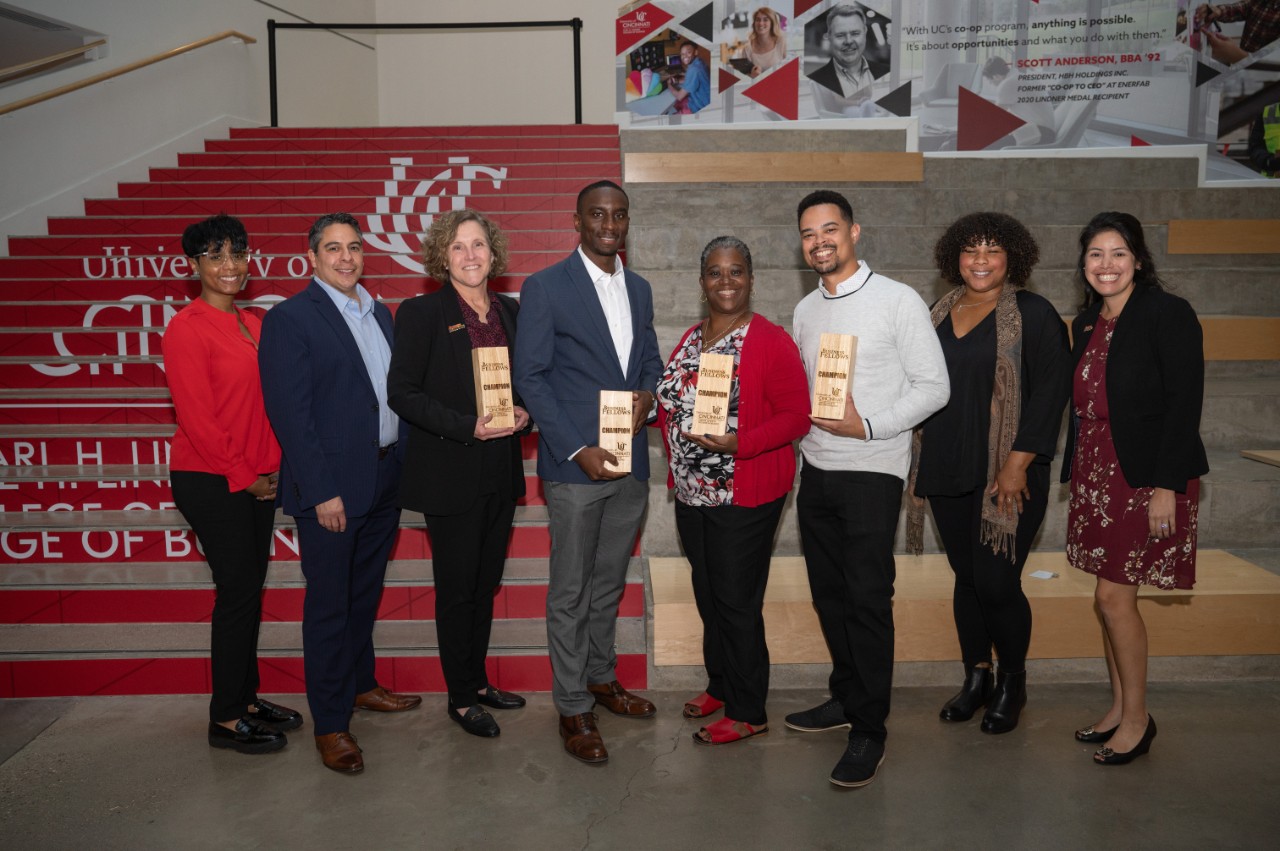Inclusive Leaders Start Here
Lindner’s first-year Business Pathways course teaches students the nuance of a true leader from day one

Supporters celebrated graduating Business Fellows at the annual Toast event.
“Before going in, I thought leadership was a person that you can look up to, to help lead you in the right direction and goals.”
But Strobel credits her experience in Business Pathways — a required course that introduces first-year students to the PACE (professionalism, academics, character, engagement) curriculum and sets them on a path to success — with opening her eyes to what a true leader stands for.
Crafting a "pathway" to leadership
Seeing an opportunity to cultivate students’ leadership skills and cultural awareness, Lauren Thomas, associate director of undergraduate academic advising, and Brittany Wagner, assistant director of undergraduate academic advising, crafted a four-lesson sequence embedded into Business Pathways’ teachings.
The curriculum begins with an introductory overview of leadership, creative thinking and solving “wicked problems.” Through the duration of the course, students are guided by the leadership definition offered by Lindner alumnus Kirk Perry, BBA ’90, president and CEO of Circana:
“Leadership is the consistent practice of humility, authenticity and vulnerability that creates an environment where people can do their best and people can see the best in themselves.”
They then build on these ideas with an introduction to servant leadership, accompanied by an activity to engage in their community and identify servant leader role models. In the third lesson, students engage in conversations surrounding cultural competence, bringing awareness to their own identities, perspectives and attitudes. The final lesson ties it all together, challenging students to create positive, inclusive environments as leaders.
These lessons allow students to gain exposure to the core tenets of Lindner’s Office of Inclusive Excellence: access and engagement, cultural competence, crucial conversations, and ethics. Students walk away with a thorough understanding of these principles and the power to apply them.
“Everyday life cultural competence is not only educating yourself on other cultures and how they immerse in our culture,” said entrepreneurship major Alijah Newton, BBA ’27. “But using that as an understanding and looking at everything from a non-biased point of view and knowing how to operate in those different groups.”
Our goal has always been to provide students with practical tools that they can use now and in the future to empower those around them and to promote understanding and connection
Nicholas Castro, JD Assistant dean of inclusive excellence
Nicholas Castro, JD, assistant dean of inclusive excellence, hopes introducing these concepts during students’ first year will spur further conversations.
“Our goal has always been to provide students with practical tools that they can use now and in the future to empower those around them and to promote understanding and connection,” said Castro. “Effective business problem solvers can adapt to different environments and cultures with ease. They can engage in challenging conversations because they have a roadmap navigating them through. Our students will have a head start on these skills and use them effectively in their co-ops, student organizations, the classroom and beyond.”
Making connections
This new knowledge combined with continuous reflection throughout the course encourages students to build their own leadership philosophies.
For Liam Hutchinson, BBA ’27, his leadership outlook is guided by service-learning experiences and his understanding of the diversity of perspectives others bring to projects and the classroom.
“Being there for everyone in your team to make sure that everybody is working together and efficiently to reach a common goal,” defines Hutchinson.
Strobel reflects these same themes of collaboration, teamwork and the betterment of the whole.
“After the course, I feel like leadership is more teamwork. Collaborative work where you want everyone involved and it’s important to have all aspects covered.”
Armed with a better understanding of what it takes to be an effective, inclusive and informed leader, students apply these lessons across their classroom and professional exploits.
“I had the basic idea of leadership before I came into college, but then I was presented the opportunity to be project manager the first semester in one of our classes. With what we learned in pathways, I looked back and I saw the actual impact of that,” reflected Hutchinson. “Those concepts were more realized to me. Being a leader, it’s important to include everybody.”
Putting it into action
Students leave empowered to define their professional trajectories in line with their own value systems and spark difficult conversations.
“When I go to different career fairs, I do make sure that it [inclusion] is a value of the different companies that I’m speaking with. I ask them how that looks in their company. The different resource groups they may offer. How do they create a sense of belonging within their companies?” said Newton. “That’s been taught to me through my courses like Business Pathways and workshops through Business Fellows. I feel like Lindner has really instilled that and helped me to be able to communicate those as values of importance to me.”
The business case for inclusivity often centers the recruitment and retention of top talent, attracting students like Newton.
“Our company is dedicated to our DE&I initiatives and knows the importance of recruiting diverse talent. Our CEO, Rich Bielen, signed a DE&I pledge in 2019 that confirmed our commitment. It’s important to instill leadership and cultural competency skills to students to set them up for the corporate world,” said Shelli Brown, talent acquisition partner at Protective Life Services. “This will give them a head start as they enter their professional careers. I think they can also instill these skills as they join organizations for co-op or internship opportunities.”
As students ascend to their second year, they embody Castro’s vision of expanding these conversations beyond the classroom.
“I think before coming to Lindner, I was scared. I like to talk to my friends, but now I’m very open and honest and say ‘Hey, this is what I believe. What do you guys believe?’” reflected Strobel. “Including more people in the conversation has really helped my view and understanding and respect those people in the same way that I would want to be respected.”
A Year to Remember
Lindner’s Office of Inclusive Excellence celebrated major milestones, cross-country travel and student accomplishments during the 2023-24 academic year.
April 2024
Featured image at top: Friends and supporters of the Office of Inclusive Excellence toasted to 2024 graduates at the annual Toast event.
March 2024

Students got a ‘Jumpstart’ on their professional journeys as students from the Jumpstart pathway program to Lindner connected with industry professionals and top employers in Dallas, Texas.
December 2023

A cohort of 46 students jetted off to Seattle for a ‘business trip’ during the 2023-24 winter break, where they grew closer as a community and networked with representatives from local companies.
October 2023

The Office of Inclusive Excellence marked 10 years of its Business Fellows program by recognizing the program’s early supporters and champions at its 2023 Homecoming celebration.